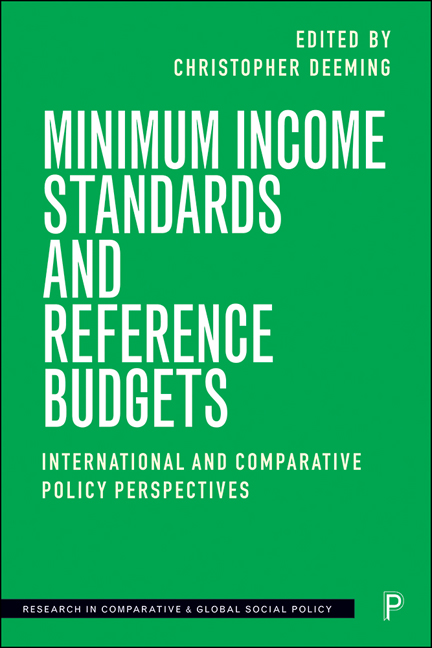4 - The French Experience of Reference Budgets
Published online by Cambridge University Press: 12 March 2021
Summary
Introduction
This chapter deals with the French experience of reference budgets (RBs). Under the same general heading of RBs, one can find quite different approaches to setting some minimum budget that could inform policy objectives. The ones that have been developed in France since 2015 follow the Minimum Income Standards (MIS) methodology initiated in the UK. Apart from the UK, France is the country where such RBs have been carried out in the most extensive way. Results have been published for middle towns in 2015 (ONPES, 2015) and research has been undertaken to expand these budgets to rural areas and the Great Paris.
The first section of the chapter presents the motivations and objectives of this research and provides some historical background concerning the establishment of standard budgets more generally. The next section presents the theoretical background and the conceptual framework that have been used to construct these budgets. Section three describes the key methodological choices that have been made and the motivations for these choices. The last section highlights the main results of the study, the related research findings that were motivated by this indicator and the place of these reference budgets in the French policy debate.
Objectives of the research and historical background
Recent research on reference budgets was funded in France by the Observatoire National de la Pauvreté et de l’Exclusion Sociale (ONPES, National Observatory on Poverty and Social Exclusion), an agency of the French government that was established in 1998 to report on the state of poverty in France. Since it was set up, the ONPES has aimed at setting up a series of indicators gathered together in a dashboard, the purpose of which is to highlight the multiple factors of poverty and social exclusion.
For a number of years the ONPES has wondered about the ‘halo of poverty’ to better understand what life is really like for populations who are not necessarily poor in the conventional statistical sense of the term (those who find themselves below the monetary poverty line at 60 per cent of the median standard of living), but who do not have all the means needed for full participation in social life. Another concern was that the usual poverty indicators were conventional and found it difficult to gather any consensus.
- Type
- Chapter
- Information
- Minimum Income Standards and Reference BudgetsInternational and Comparative Policy Perspectives, pp. 55 - 66Publisher: Bristol University PressPrint publication year: 2020



